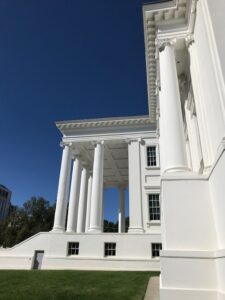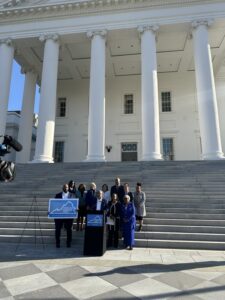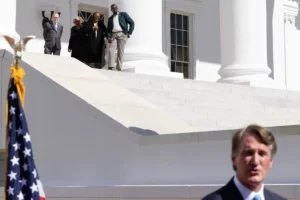
Virginia General Assembly Building (new)
by David J. Toscano
For over a month, Virginia’s legislature and governor have been embroiled in a “two scorpions in a bottle” fight over the new biennial budget, which must be passed by June 30, 2024, to fund the government. Last Wednesday, each of them loosened the cork in the carafe. After Assembly-initiated discussions with the governor, Virginia leaders showed, for one moment at least, how the commonwealth operates differently from Washington, D.C. Rather than force Youngkin to take the political hit from vetoing the first Virginia budget in recent history, the House of Delegates used an unusual procedural move, and killed it themselves. All sides committed to producing a new budget and to return on May 15 to pass it. As Churchill once said, “Now this is not the end. It is not even the beginning of the end. But it is, perhaps, the end of the beginning.”
Budget battles in the commonwealth are not unusual, but this one has been unique, both in the number of changes Republican Gov. Glenn Youngkin proposed to the bipartisan spending plan, and in the rhetoric that has accompanied the process. Youngkin called the bill a “backward budget” and traveled the state on this theme. Legislators fired back, did their own tour, and likened Youngkin’s actions to “what spoiled brats do when they don’t get what they want.”
Last Wednesday, both sides returned to Richmond for the “reconvened” or “veto” session. The governor had vetoed a record number of bills, including measures to protect reproductive rights and enhance gun safety. Since overriding a veto requires a two-thirds vote, the governor was successful with every veto.
The fight over the budget bill is different. Youngkin, like governors in 44 states and unlike our U.S. President, has the power to “line-item veto” specific provisions in the budget. His targets were thought to be a tax on digital services he originally proposed and language that requires the commonwealth to rejoin the Regional Greenhouse Gas Initiative (RGGI). But he abandoned this approach when legislators shrewdly drafted these provisions to make a line-item veto legally problematic.
It does not matter whether you are a Republican or Democratic governor; legislative power is clear in the budget process. Several years ago, Governor McAuliffe learned how crafty legislative budget writing can frustrate key executive goals. The governor hoped to expand Medicaid through the budget, but Republican leadership was resistant, and explicitly included language in the budget to prevent it. McAuliffe attempted to line-item veto that provision, only to have House Republican leadership opine that the Governor had no such constitutional or statutory power to do so. When it comes to the budget, legislators enjoy proclaiming “governors propose; the legislature disposes.” Continue reading →


 by Jock Yellott
by Jock Yellott

 by Jon Baliles
by Jon Baliles
 by Arthur Purves
by Arthur Purves








